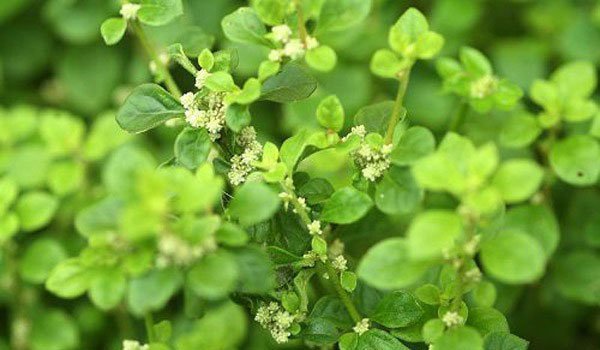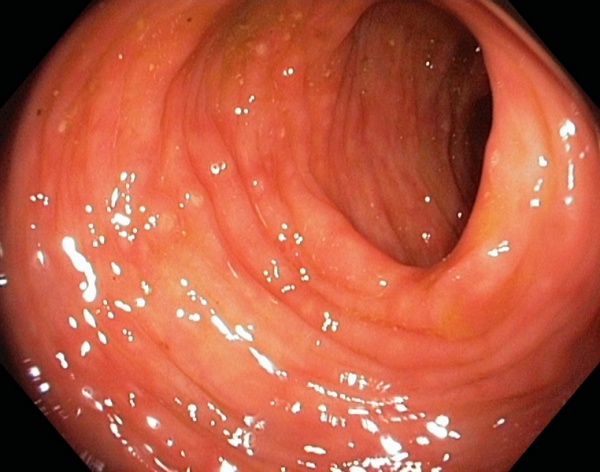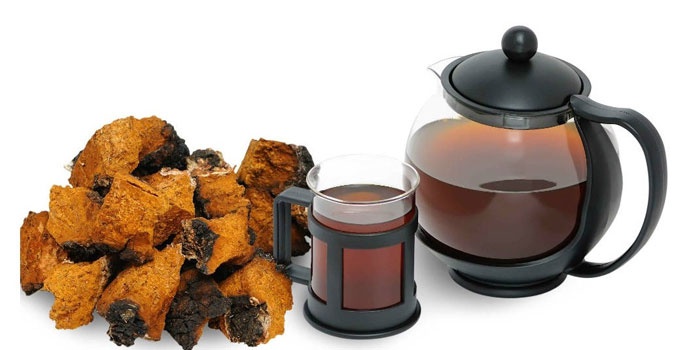Herbs-ants in the "pot-bellied" period or the use of herbal medicine during pregnancy
Many pharmaceuticals are prohibited during pregnancy or used with caution. Women are trying to find a safe treatment, so they switch to medicinal plants. But such a replacement cannot be called correct. What herbs are allowed during pregnancy, even the doctor will not always tell. You need to focus on the active substances in their composition and the mechanism of action on the body.
Phytotherapy rules
The World Health Organization supports herbal medicine methods in cases where scientifically proven methods are not available. But treatment with medicinal plants is not recommended as the main method, especially in severe diseases.
Medicinal herbs are dangerous if harvested incorrectly. Near industrial enterprises, in the city or along highways, plants accumulate many harmful substances, carcinogens. The time of year when raw materials are harvested matters. Most often this is the period of spring or summer, during active growth or flowering.
To use high-quality herbs for treatment, you need to buy them in a pharmacy. These plants are grown in clean areas and do not contain hazardous impurities. Procurers observe assembly terms, rules of drying and storage.
Self-collected plants are not always of the species and genus that is needed. Many related herbs are similar to each other, but differ in the amount of useful substances or may contain additional chemical components that have a pronounced side effect. For example, for external use, pregnant women are sometimes allowed a decoction of St. John's wort. But it is similar in appearance to St. John's wort, which is less effective.
In the 1st trimester, doctors recommend avoiding any medicinal plants. This is the period of embryo formation and organ laying, so it is impossible to predict what effect the herbs will have. In the rest of the pregnancy, herbal medicine should be discussed with your doctor.
Dangerous plants and their combinations
Herbs prohibited during pregnancy have various effects on the body of the mother or fetus:
- teratogenic;
- hormone-like;
- abortive;
- toxic.
But some plants may be banned at the beginning of the term and approved in the last months, or vice versa. The danger is the use of herbal decoctions and infusions inside, topical application does not lead to the absorption of substances, therefore it is considered safe.
Any drugs prepared in the form of an alcoholic tincture for oral administration automatically fall into the prohibited group. This is due to the action of ethyl alcohol, which causes deformities of the fetus, disrupts the development of the nervous system.
Teratogenic effects
Dangerous herbs with a teratogenic effect, prohibited in the 1st trimester:
- ginseng;
- American pokeweed;
- succession;
- sagebrush.
Ginseng infusion is often used for low blood pressure, weakness, decreased immunity. But in pregnant women, this plant can lead to congenital anomalies in the development of the fetus. Wormwood in folk medicine is used externally and in the form of decoctions with reduced appetite, lipid metabolism disorders. But for pregnant women, this is a bad way to stimulate the desire to eat when. It is impossible to determine the exact dosage that will lead to deviations in the structure of the fetal organs. Wormwood is prohibited during the gestation period in any quantities, regardless of the period. It can cause seizures, hallucinations, and bleeding.
Rhubarb is dangerous for the formation of the skeleton. Therefore, it is not recommended to drink it in any form. The sequence causes malformations, but can be used as an external remedy.
Hormone-like effects
During the gestational period, a certain balance of hormones is maintained in the blood. Its change leads to the cessation of embryo development, premature birth. Have an estrogen-like effect:
- sage;
- hop;
- licorice;
- alfalfa;
- clover;
- anise.
Sage is used in the treatment of colds, gastritis, stomach ulcers and digestive disorders. For pregnant women, it can only be used externally for the treatment of infected wounds, with burns and frostbite. It is allowed to rinse the mouth with a decoction of sage for nausea in the 1st trimester, but drinking is prohibited.
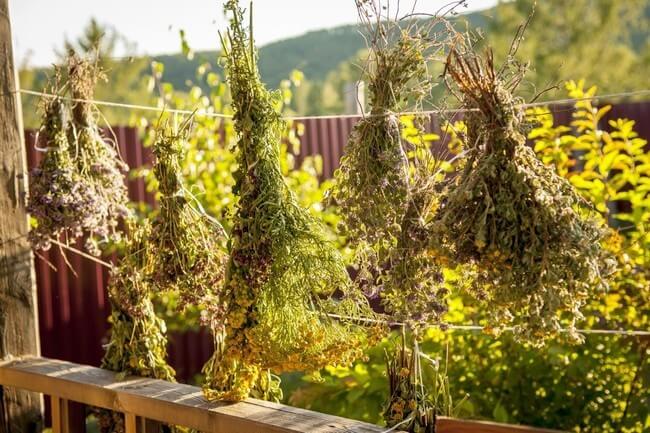
St. John's wort has a strong effect on the hormonal background, it has an abortive effect.
The list of herbs that can lead to is different in different sources. Among the dangerous species are:
- corn silk;
- hop;
- St. John's wort;
- anise;
- fenugreek;
- juniper.
To choose raw materials for safe treatment, you need to consult a doctor. Self-medication can lead to irreversible consequences.
With abortive effect
What herbs should not be drunk during pregnancy, traditional medicine determined at the dawn of mankind, when women did not have the opportunity to terminate an unwanted pregnancy surgically. Plants that cause abortion, lead to bleeding, stimulate uterine contractions and death of the fetal egg. In the second trimester and beyond, they can cause preterm labor. The following representatives are dangerous:
- knotweed - provokes a miscarriage in the 2nd trimester;
- parsley - increases the tone of the uterus, can cause contractions and premature birth;
- hyssop - dangerous at any time;
- tansy - raises blood pressure, in women with hypertension or preeclampsia can cause placental abruption;
- thyme and sage cause uterine bleeding, leading to miscarriage.
Some sources indicate that in large doses, or premature birth can lead to:
- oregano;
- aloe;
- juniper;
- lovage;
- lumbago high;
- viburnum;
- shepherd's bag;
- barberry;
- periwinkle.
Large doses of tea based on chamomile, raspberries, calendula, ginger are dangerous. In small quantities, they are often used as anti-inflammatory agents. But frequent use of the decoction affects the synthesis of prostaglandins, which accelerate the maturation of the cervix and can cause.
Other dangerous herbal remedies
Contraindicated herbs can affect metabolism, interfere with absorption, or forcefully remove the necessary components from the body. Therefore, the list of dangerous medicinal plants is expanding.
You need to beware of fees with a toxic effect. Some have cumulative properties. This means that with a single dose there will be no negative effect, but with regular use, the active substances accumulate in the body, and an undesirable reaction appears. These include:
- belladonna, muzzle;
- larkspur, passionflower;
- celandine, ephedra;
- tobacco, dope;
- thermopsis, ergot;
- magnolia, chilibuha;
- snowdrop.
Nettle is able to increase blood clotting, but in the last stages of pregnancy, this process starts naturally. So the body prepares to stop bleeding during childbirth. Therefore, an additional increase in the ability to coagulate will be harmful, this is an increased risk of thrombosis.
Cornflowers have a high content of toxic cyanides and a pronounced diuretic effect. Fluid loss leads to a decrease in calcium, potassium, and sodium ions in the blood. This is an additional risk of violation of pressure, contractility of the uterus. Calamus has a diuretic effect, which is also contraindicated.
Licorice is often used as an expectorant. However, it affects the hormonal background.
Hay grass is used for constipation to accelerate the excretion of feces. But during pregnancy, it can cause a large flow of blood to the uterus, increase tone and provoke a miscarriage. It is undesirable to use echinacea, violet, pepper, which can disrupt bowel movements.
What Benefits
Herbs are useful for pregnant women, which are used as adjuvants for the treatment of colds, cystitis, coughs, and to reduce the symptoms of toxicosis. Doctors prescribe many forbidden plants as external agents. They act locally and are not absorbed into the blood, so they do not have a harmful effect on the mother's body or the fetus.
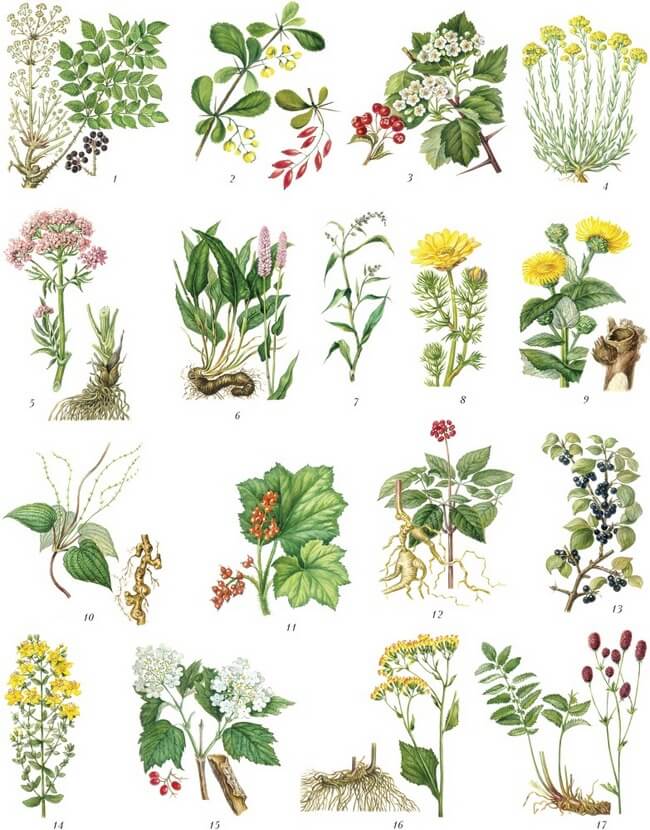
Medicinal plants: 1 - Manchurian aralia; 2 - common barberry; 3 - common hawthorn; 4 - sandy immortelle; 5 - valerian officinalis; 6 - highlander snake; 7 - mountaineer pepper; 8 - spring adonis; 9 - high elecampane; 10 - Caucasian Dioscorea; 11 - lure high; 12 - ginseng; 13 - laxative gesture; 14 - St. John's wort; 15 - common viburnum; 16 - broad-leaved ragwort; 17 - pharmacy burnet.
Sedation fees
Pregnant women often experience mood swings, tearfulness, excessive anxiety. Stress, nervous strain have a bad effect on bearing a child. They trigger the release of adrenaline and cortisol, which can cause a rise and threat of interruption. It is not always possible to calm down on your own. Therefore, doctors prescribe decoctions of herbs.
Valerian root is considered safe. No need to try to find it in wildlife, it is much safer to buy ready-made raw materials in a pharmacy. But doctors prefer to prescribe valerian extract in tablet form. This allows you to accurately select the dosage and prevents the occurrence of side effects.
For those who decide to cook a homemade decoction, you need to follow the recipe:
- 10 g of dry root pour 200 ml of boiling water.
- Keep the mixture in a water bath for 30 minutes, leave to cool under the lid.
- Strain.
- Drink 1 tbsp. l. 4 times a day.
Long courses of treatment with herbal preparations are not recommended. Valerian infusion is enough to take for a week, then you need to take a break.
Those who drink valerian root decoction for more than 2 weeks may experience the opposite effect. There are headaches, the work of the heart, sleep is disturbed, excessive irritability appears.
In pharmacies, motherwort tincture is sold. But it is contraindicated for pregnant women because of the alcohol content. With increased anxiety, insomnia, indigestion, flatulence, you can drink a decoction of motherwort. But not everyone likes its taste and aroma. You can add half a teaspoon of dry raw materials to ordinary tea per 200 g of water and brew in the traditional way.
Regular intake of motherwort tea will have the following effects:
- equalizes blood pressure;
- calm heart attacks;
- improve digestion;
- get rid of flatulence;
- will improve sleep.
If you follow the dose and do not abuse the decoction of motherwort, you can remove a slightly increased tone of the uterus, eliminate intestinal spasm.
Threat of interruption
At an early stage or with the appearance of spotting, the herb cuff is recommended as an aid. It helps to stop bleeding, reduces vascular permeability. But as an independent treatment, it may not be effective. The cause of miscarriage in the short term is often a lack of progesterone. Therefore, drugs are needed to compensate for the lack of a hormone. With the help of herbal medicine, you can stop bleeding and reduce uterine contractility. Complement the treatment of valerian or motherwort.
Treatment of colds
During pregnancy, a natural decrease in immunity occurs. With viral infections, it is impossible to help the body with immunomodulatory and antiviral drugs, they are contraindicated for expectant mothers. You can improve the condition with the help of medicinal decoctions.
To reduce the inflammatory response, lower the temperature, increase immunity and speedy recovery, you can drink tea with blackcurrant leaves, willow-herb, linden blossom. It is better to buy each component separately at the pharmacy and brew in one teapot.
What herbs can gargle with a cold:
- chamomile decoction;
- calendula;
- eucalyptus;
- Oak bark.
They will only have a local effect, so they are safe for pregnant women. Some doctors recommend sage, but it must be used very carefully and not swallowed. Sage leaves are hormone-like drugs.
Expectorant herbs licorice and thermopsis are contraindicated. For a short time, breast fees can be applied based on the following types:
- marshmallow;
- oregano;
- coltsfoot;
- plantain.
For the treatment of a wet cough or sputum thinning, you need to mix the components in equal proportions. Take a tablespoon from the mixture and pour it with a glass of boiling water, simmer for 15 minutes. Cool and strain. Take half a glass 2 times a day before meals. The duration of treatment should not exceed 1 week.
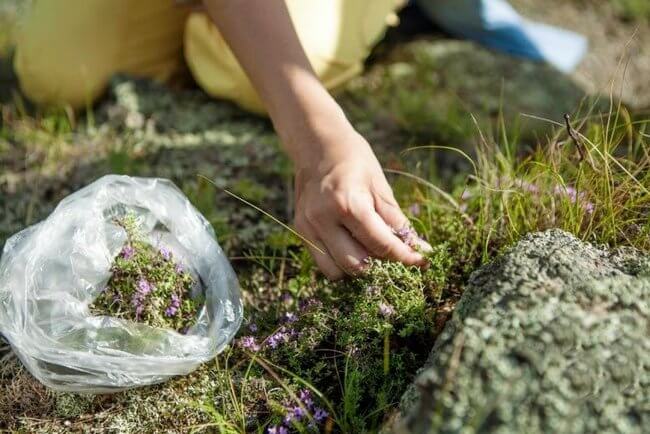
Rosehip is not contraindicated throughout pregnancy, its fruits can be added to tea during the season of colds. Raspberry accelerates the ripening of the cervix and can lead to premature birth. Therefore, it is not used to treat colds until the last date. It is allowed to drink tea with raspberry leaves after 34 weeks in the absence of the risk of preterm birth.
For cystitis and kidney disease
In pregnant women, cystitis is a common occurrence. A decrease in local immunity, a violation of the outflow of urine due to a growing fetus, vaginitis contribute to the infection in the bladder. It is impossible to cure inflammation with the help of medicinal fees; antibiotics are needed that act against the microbial flora. But fees for cystitis can reduce inflammation, improve the outflow of urine and speed up its excretion from the kidneys.
- Intercostal neuralgia - what is it and how to treat
- How to quickly get rid of dry corns on the legs
- How to treat left ventricular hypertrophy
- Rating of the best drugs for rotavirus for children
- Making tea from currant leaves, the benefits and harms of the drink
- How to drink hydrogen peroxide according to Neumyvakin - an oral regimen
- Features of the treatment of plantar fasciitis with folk remedies
- The composition and beneficial properties of parsley root
- How to get pregnant quickly? Folk remedies
- Herbs-ants in the "pot-bellied" period or the use of herbal medicine during pregnancy
- Why does a sore throat and dry cough occur, and what treatment is required?
- Guy's Room Design: Ideas and Examples
- General rules for drawing up a foundation plan House foundation drawings
- modern art deco bedroom small art deco bedroom
- Pansies: characteristics and photos of flowers
- Making an art deco bedroom: the choice of materials Beige art deco bedroom
- Bedroom interiors in art deco style Bedroom art deco style beige
- Young: planting and care in the open field Young planting and care in the open
- Varieties for open ground
- Pansies: cultivation and care in the open field




